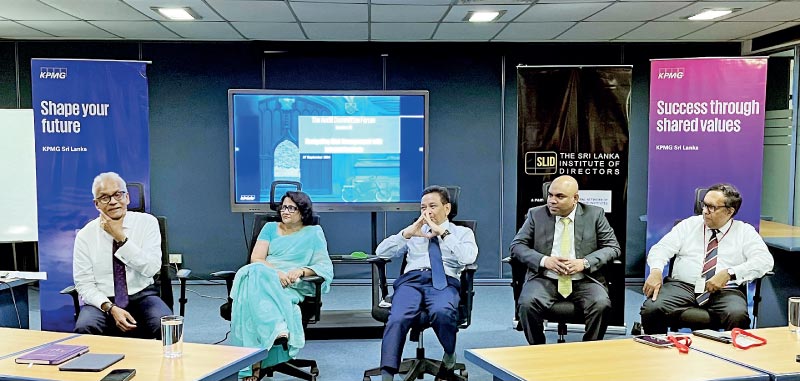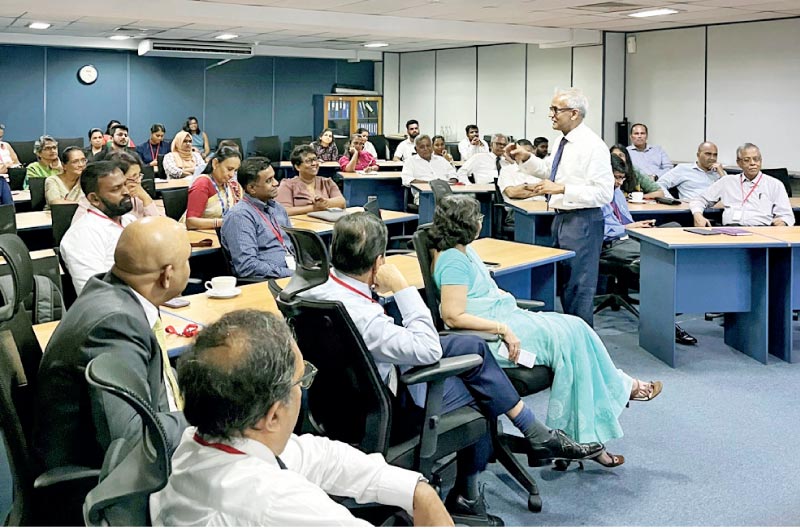Monday Feb 16, 2026
Monday Feb 16, 2026
Monday, 21 October 2024 00:36 - - {{hitsCtrl.values.hits}}

The Audit Committee Forum organised by the Sri Lanka Institute of Directors titled ‘Navigating Risk Management with Internal Controls’ offered valuable insights into the critical role of robust internal controls in managing risks and ensuring organisational success.
With a focus on governance, risk management, and financial oversight, the forum served as a platform for key discussions on how audit committees can protect businesses from potential risks.
The session was led and moderated by KPMG in Sri Lanka and Maldives Partner and Chief Operating Officer Suren Rajakarier, alongside a distinguished panel featuring Bogala Graphite Lanka PLC Chairperson Coralie Pieterz, HNB and CIC Holdings Director Rimoe Saldin, Ceylon Chamber of Commerce CEO/SG Buwaneka Perera, and McDonald’s Corporation CFO Asia Salinda De Silva.
Together, they delved into the evolving role of audit committees and their crucial role in assisting risk management through oversight of internal controls.
In his presentation, Rajakarier highlighted critical changes in the CSE listing rules that include the following as ‘Functions of Audit Committee’:
It was noted risk management is everyone’s responsibility and the audit committee’s oversight of risk policies is essential in controlling and mitigating various threats that could destabilise an organisation. Implementing robust internal controls is essential to mitigate these risks and ensure organisational success. The importance of risk assessment, control activities and the three lines of defence was also highlighted by the presenter in addition to advocating preventive controls as a key measure to manage risks. The participants were cautioned with the prospect of regulators imposing penalties on Boards failing to maintain proper internal controls, as experienced in the US. During the panel discussion, the panellists shared insights on how companies can create a proactive risk culture, noting that effective risk management often begins with strong internal controls, proper training, and open communication channels. In particular, the panellists discussed the challenges faced by finance functions in reducing risks, including financial losses arising from non-compliance with internal controls. Another key takeaway noted was the necessity of continuous improvement within audit committees, particularly in terms of creating a culture that prioritises integrity and control conscious culture that aligns with an organisation’s third line of defence — the internal audit. By fostering such a culture, companies can close gaps in their control systems and drive long-term value.
Certain basic steps to navigate this terrain relate to:
The session also explored how process risks — particularly in franchise/decentralised operations — can lead to significant reputational losses if not managed properly. Errors in complying with Standard Operating Procedures (SOPs) can cascade through an organisation, creating vulnerabilities that might harm the parent company. Therefore, preventive measures, driven by the right organisational culture, are essential in mitigating these risks. As noted by the panel, the best control is a strong culture of compliance and integrity within the organisation.
It was revealed that the next session of the Forum will focus on Environmental, Social, and Governance (ESG) risks. Under the evolving regulations, audit committees will play a key role in ensuring that companies not only comply with ESG regulations but also integrate sustainable practices into their core operations.
In an era where businesses face an array of complex risks, the 29th Audit Committee Forum organised by Sri Lanka Institute of Directors with KPMG Sri Lanka as the Knowledge Partner, emerges as a pivotal platform for fostering collaboration, sharing best practices, and elevating the standards of corporate governance in the Sri Lankan business community.
